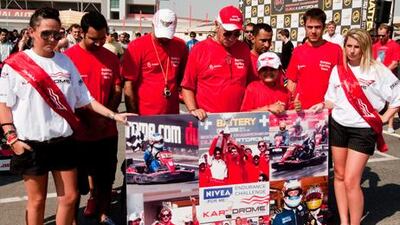DUBAI // Leading go-kart racers from Europe and the Gulf yesterday held a minute's silence in memory of the motorsport champion Christophe Hissette.
Competitors stood in silence for the Belgian driver before starting the second round of the Battery 24 Hours Endurance championship, held each year at the Dubai Kartdrome.
Hissette's team, Batelco, from Bahrain, won the first round with Hissette's help in April.
Teammates and friends at the track wore T-shirts printed with the fallen racer's picture and displayed stickers in the shape of jigsaw puzzle pieces, which Hissette used to sport on his helmet.
"It's hard for us to even take part in the competition today, but we came to pay tribute to him," said Osama al Saad, the Betalco team manager.
"I'm here for Christophe," said Francesca Carlson, the racer's fiancee. His parents also attended.
It was at his father Jean-Louis's urging that Hissette first hit the track at age 11. By age 29 - in between working as a media analyst in Abu Dhabi - he was competing two dozen times a year, on tracks in places such as Thailand, Bahrain and France.
His go-to event was the 24-hour karting race. He competed more than any other racer at the Kartdrome - and almost always stood on the winner's podium afterwards.
He had recently upgraded to racing cars and last year won the European Radical Masters.
Hissette was leading the regional equivalent of the race, too, but died on April 23, the eve of the eighth and final round of the championship. That round was cancelled and his friend Jordan Grogor was declared the winner.
"He was my teammate - and my fiercest competitor," said Mr Grogor.
Hissette was killed when his car veered into the wall and caught fire.
As motorsport grows more popular in the UAE - and more competitive - more accidents are likely to occur, said Dubai Autodrome spokesperson Paul Velasco. Each year a handful of racers end up in the hospital.
"At the end of the day, motorsport is dangerous," he said.

